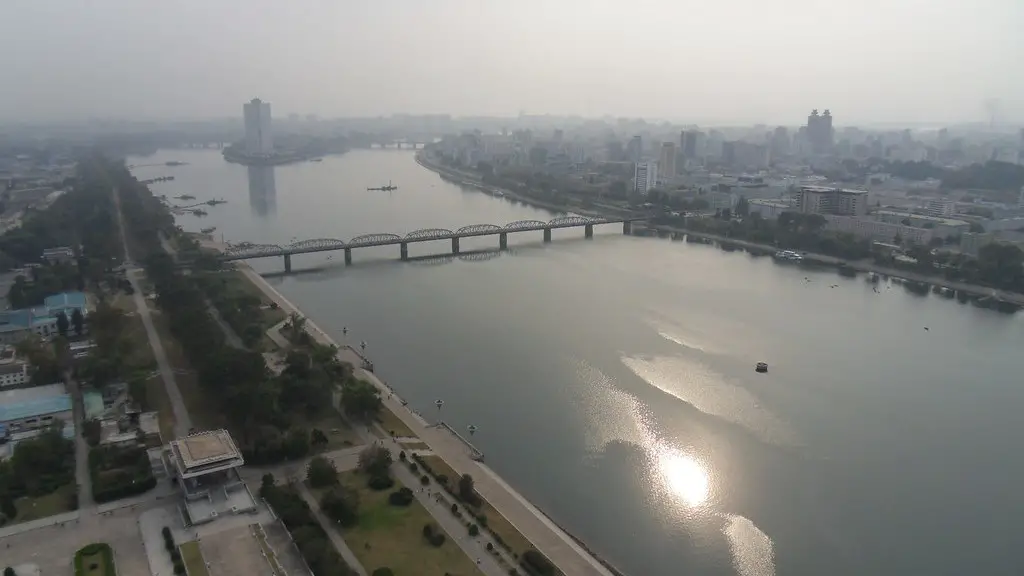North Korea has long been at the center of political and security debates because of its development of Intercontinental Ballistic Missiles (ICBMs). This has been a source of great concern, as the countries technical advancements have gone far beyond what many had initially expected.
Recent reports show that the North Korean government has been conducted several tests to develop and strengthen their ICBMs. This has resulted in the capability for their ballistic missile to reach up to 6,400 miles and has caused security experts to ask the question: Can North Korea ICBM Reach US?
The answer is yes, due to the fact that North Korea has long-range missiles and could potentially deliver nuclear weapons to the United States. However, the reality is that long-range missiles are incredibly difficult to control, and launching one involves many unknown and unpredictable variables that can affect the accuracy of its trajectory.
Additionally, North Korea is believed to not have the technology yet to arm their missiles with miniature nuclear warheads which would be required for it to reach the United States. Even though the United States is working to improve its defensive capabilities, there still remains the possibility that North Korea can reach the U.S.
Military and political experts agree that the current situation is not ideal. Some have suggested that the United Nations and international community should work together to ensure that North Korea cannot continue to develop its ICBMs and potentially threaten other countries. Others have argued that the only way to truly contain the threat is for the United States to take a more active role in the situation and push for the implementation of sanctions and other measures designed to limit North Korea’s ability to continue developing such weapons.
No matter what decision is made, it is clear that North Korea’s development of ICBMs is a pressing security concern that must be addressed quickly. North Korea’s advancements demonstrate a readiness to use such weapons, which leaves the United States and other countries vulnerable to a potential attack. The international community must work together to contain the threat, both physically and diplomatically.
North Korea’s Political Agenda
International security is directly linked to North Korea’s determination to maintain its autocratic regime. The Kim family’s steady consolidation of power has created an environment preoccupied with maintaining the existing structure and protecting their legitimacy. In this context, it views any type of diplomatic or military challenge as a direct attempt to undermine their authority and is unlikely to give in quickly to any form of negotiation.
Experts point out that North Korea has invested heavily in its current political agenda and will continue to do so as long as its survival is at stake. This includes loaning out members of its military forces as mercenaries or using missile proliferation or arms trading as a source of income. It also means that North Korea is likely to use its ICBMs as a means of achieving its objectives.
North Korea’s approach to foreign policy is also different from that of other countries. Its philosophy of “self-reliance” means that it prefers to be unpredictable and assertive in its dealings with the rest of the world. This makes it difficult to find common ground when it comes to nuclear disarmament and arms control in general as it is not interested in any kind of dialogue.
Given that the North Korean government is so intent on maintaining its current political structure and military prowess, many security experts are skeptical that North Korea can or will be willing to come to terms with the international community. Despite international pressure, the country continues to develop its ICBM capabilities.
The Value of Treaties
One way that North Korea’s ICBM development can be contained is through treaties and agreements with other countries. Doing so will create a framework within which North Korea must abide by and provide an incentive to end its development of ICBMs. This could involve negotiations with the United States and other regional powers in order for the parties to reach a mutually beneficial agreement.
The United Nations has already begun to take action in this regard. The UN Security Council has imposed a series of sanctions in an effort to limit North Korea’s nuclear ambitions and restrict its economic activities. These have had a limited effect and have been increasingly ignored by the North Korean government as it continues to pursue its own interests.
The most viable way for the international community to contain the North Korean threat is for the United States and other countries to directly engage in talks with the North Korean government in an attempt to create a binding treaty that prevents the country from further developing its ICBM capability. Such an agreement would involve other countries, particularly those in the region who are most at risk of retaliatory strikes, and would provide an effective way to contain North Korea’s ambitions.
The international community is well aware of the danger posed by the North Korean government. It is essential that countries work together and find a way to contain the threat of ICBMs and help bring about a peaceful resolution.
The Debate Over Economic Sanctions
The most common tool used to contain threats posed by North Korea is the imposition of economic sanctions. This involves the restricting of trade and investments with the country in an attempt to force compliance with international laws and agreements.
The effectiveness of these measures is debatable, however. Many argue that they are only effective when they are accompanied by an engagement process that includes dialog and the exchange of ideas. This is difficult to achieve given North Korea’s aversion to international cooperation and their refusal to take part in talks.
Sanctions can also have a detrimental effect on the country’s stability as it deprives them of vital resources and can damage the economy. This can lead to more dire consequences as the population is put under growing pressure and the government is forced to pursue more aggressive tactics.
Sanctions are not a silver bullet and should only be used as a last resort. It is essential that the international community seeks to engage North Korea in talks in order to reach an agreement that prevents the further development of ICBMs and ensures the security of the region.
The Effects of US Policy
The United States has taken a largely passive stance in regards to North Korea and has often used diplomacy and economic pressure as its primary means of influencing policy. Although this approach has achieved some degree of success in the past, it is clear that a more aggressive strategy is needed to completely contain the North Korean threat.
The United States has to be willing to take action and not defer to the rest of the international community. This could involve other countries, such as the United States’ political and military allies, in order to send a strong message to the North Korean government.
The United States also has to be willing to consider other options such as military intervention. Although these are not ideal, they are sometimes necessary in order to curtail the North Korean threat. It is important for the United States to be willing to take a firm stance in order to prevent the further development of ICBMs and prevent them from becoming a serious threat to regional security.
U.S. policy towards North Korea must also take into account the impact of economic sanctions and the need for diplomatic engagement. These measures are often necessary in order to contain the North Korean threat and it is essential that the United States is willing to work with other countries and organizations in order to achieve these goals.
The Need For Cooperation
International cooperation is essential if the threat of North Korean ICBMs is to be contained. This requires countries to come together and take action in order to reach a mutually beneficial solution. This could involve the United Nations, the United States and other countries in the region in order to build a platform that would create a lasting peace between North Korea and its neighbors.
The international community must also be willing to use all tools at its disposal in order to contain the North Korean threat. This includes looking beyond just economic and diplomatic solutions and being willing to consider other measures such as military intervention.
Overall, it is up to the international community to take action and to find a way to contain the North Korean threat. This is a difficult challenge but one that must be addressed if the region is to remain secure.





